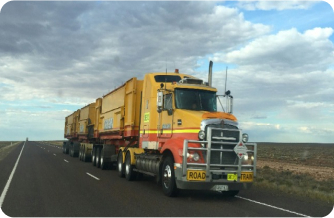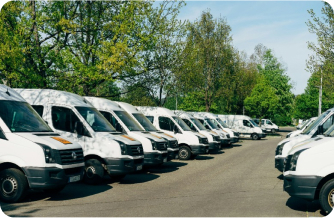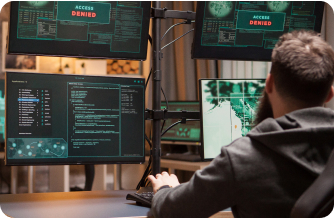GPS tracking can be a useful tool for monitoring the locations of personal and business vehicles.Depending on the specific purposes of your tracking and the needs you are hoping to address, there are a variety of styles of GPS tracking devices to choose from. In fact, GPS trackers have become an essential tool in business operations, offering benefits that range from theft prevention and recovery in the event of theft to optimizing company logistics.
GPS trackers are invaluable tools for asset tracking, offering robust solutions for monitoring and managing valuable assets efficiently. These devices provide real-time tracking capabilities, allowing businesses and individuals to see the precise location of their assets at any moment. This feature is especially crucial for high-value items, such as construction equipment, large containers, or goods in transit, minimizing the risk of theft or loss.
GPS tracking devices can also be invaluable tools for enhancing personal safety and providing peace of mind for parents, pet owners, family members, individuals, and more. We’ll explore the benefits, key features, and top recommendations of GPS trackers for personal safety on the market today.
GPS trackers are essential for fleet tracking, significantly enhancing management and efficiency. They provide real-time location data, enabling fleet managers to ensure vehicles stick to routes and schedules, optimize route planning, and reduce costs. These trackers also improve safety by monitoring driver behaviours, like speed, and helping in targeted training to improve driving habits.
Furthermore, they assist in regulatory compliance by keeping detailed records of vehicle usage. GPS trackers streamline fleet operations, improve service delivery, and boost overall efficiency.
Top Features Of Our Platform
Geofencing
Enables setting up virtual boundaries and sends alerts if the tracker enters or leaves a designated area.
Speed Alerts
Sends notifications if the tracker exceeds a set speed limit
Real-Time Tracking
Allows for monitoring the location of the tracker in real time
Access via Mobile App
Allows users to monitor and control the tracker through a smartphone application
Location History
Stores historical location data, which can be reviewed later
Connectivity
Types of network connection supported (e.g., GPS, Wi-Fi, LTE).
Business Applications of GPS Trackers
Here are some valuable business applications of GPS that can significantly enhance workplace performance and provide managers with detailed insights:
Monitoring the movements of employees for a variety of purposes including efficient dispatch
Safeguarding lone workers in the field by monitoring locations in case of emergencies
Preventing theft and loss of expensive field equipment
Tracking valuable insights related to fleet movement, driver safety, route planning, vehicle maintenance, and more.
Small Business
- Basic tracking
- Cost-effective
- Minimal hardware
Medium Business
- Comprehensive reporting
- Business system integration
Large Enterprise
- Scalable solutions
- Advanced analytics
- International tracking
Light Vehicles
- Basic tracking needs
- Mobile access
Heavy Vehicles
- Durable devices
- Detailed vehicle
- Driver reporting
Efficient Dispatch
- Real-time tracking
- Route optimization
Lone Worker Safety
- Panic buttons
- Fall detection
- Emergency location sharing
Theft Protection
- Geofencing
- Unauthorized use alerts
Fleet Insights
- Fleet utilization
- Predictive maintenance
- Safety monitoring
GPS Trackers for Specialized Environments
Using GPS trackers in extreme conditions can present a whole new set of challenges and concerns. These environments may require that your tracking devices are rugged, waterproof, and durable to impacts to ensure that they can withstand the harsh environment where they are being used. Some examples of harsh environments could include maritime, mountainous, or desert areas. Let’s dig into some of the technical specifications recommended to make your device suitable to meet these demands.
Challenges for Harsh Conditions
Temperature Resistance
Temperature fluctuations in deserts, mountains, and other extremities, can affect battery life and performance, necessitating devices with robust temperature resistance capabilities.
Waterproofing
In maritime environments, especially or areas prone to heavy rain, your tracker must be fully waterproof, not just water-resistant, in order to withstand conditions and remain continuously operational.
Ruggedness
Extreme terrain such as mountains, deserts, or tundras will require trackers to be able to withstand shocks, vibrations, and rough handling without compromising functionality.
Technical Specifications
Wide Temperature Range
Choose a device designed to operate within a wide range of temperatures, from freezing to extreme heat, to ensure performance in any climate.
IP Rating
Choose a tracker with a high IP, or Ingress Protection, rating, which indicates the devices level of resistance to water and dust ingress. An IP67 or higher rating ensures full waterproofing and dustproofing.
Shock Resistance
Choose a tracker with rugged construction and shock resistant features to withstand impacts and vibrations commonly encounteredin the field in harsher environments.
App-Based Tracking Solutions
While there is a market for app-based tracking solutions, we believe that dedicated trackers perform the job better than apps, for a number of reasons. Some of the biggest reasons are that apps operate on your cell phone, often causing a drain on battery life through overheating the phone. Plus, apps are not automatically associated with vehicles, which means you may be tracking the wrong vehicle if this is done for work purposes. If your end goal is to keep track of an employee’s company-issued phone, laptop, or tablet, a tracking app may have its place here. It’s important to remember the legal ramifications involved in app-based tracking. Tracking a person is a completely different task and should only be done with consent, in the case of adults, or knowledge, in the case of children.
When utilizing app-based tracking solutions, you leverage smartphones and mobile apps to provide tracking functionality. You can often use some of the same features--real-time tracking, geofencing, alerts, etc.--but because you are relying on cellular networks, there may be consequences in the form of battery life, data charges, and more.
BrickHouse Team Phone Tracker App
Product details will go here. Only a max of two lines per product will be allowed on each of the... Read More
Call for PricingFeatures of App-Based Trackers
Often, app-based trackers include many of the same features as a GPS tracker but without the dedicated tracking device.
There may be lower costs associated with tracking, but additional fees for more features or premium service.
User experience with app-based trackers is usually less predictable, with user satisfaction being lower for longer-term or more detailed tracking applications.
GPS Data Applications and IoT Innovation
- Emerging Technologies
- GPS Integration with Smart Home Systems
- Advanced Troubleshooting and Maintenance Tips
- Legal and Regulatory Insights
Emerging technologies are transforming the GPS tracking landscape, particularly with AI and machine learning advancements. Here's a closer look at some of these developments:
- AI and Data Analysis: AI algorithms are becoming more adept at analyzing large volumes of GPS tracking data. By identifying patterns, they can optimize route planning and provide smarter insights.
- Machine Learning for Improvement: Machine learning enables systems to adapt over time, refining accuracy and efficiency as they process more data. This ensures continuous performance improvements.
- Predictive Analytics: Using historical data, predictive analytics allows systems to forecast potential events, such as maintenance needs, before they occur, helping users stay ahead of problems.
- Future Integration: As AI and machine learning evolve, we can expect deeper integration into GPS devices and software, enhancing real-time decision-making and improving user experiences.
These technologies are set to revolutionize GPS tracking, providing more intelligent, reliable, and user-friendly solutions.
GPS Integration with Smart Home Systems
The best way to ensure that your devices are operating as expected is to ensure that you are doing regularly scheduled maintenance and troubleshooting problems as they occur. Some of these tips may include:
- Regular software updates to keep your devices and applications functioning as they should
- Placement to ensure optimal signal and reduce downtime or wasted efforts
- Battery management to keep devices up and running at all times
- Ongoing data analysis to ensure that you are collecting the right information for your needs
Technical support relationships with your provider to ensure that any issues can be addressed and fixed in a timely manner.
AdvancedHere are some advanced troubleshooting and maintenance tips to ensure your devices operate smoothly:
- Regular Software Updates: Keep devices and applications up to date for optimal performance.
- Optimal Placement: Position devices to ensure strong signals and reduce downtime.
- Battery Management: Monitor battery life to keep devices running consistently.
- Ongoing Data Analysis: Regularly review collected data to ensure it meets your needs.
- Technical Support: Maintain a strong relationship with your provider for timely issue resolution
This streamlined approach will help keep your devices functioning at their best
To ensure compliance with legal and regulatory standards while maintaining device performance, here are key insights:
The best way to ensure that your devices are operating as expected is to ensure that you are doing regularly scheduled maintenance and troubleshooting problems as they occur. Some of these tips may include:
- Data Privacy Regulations: Ensure devices and data collection practices comply with privacy laws such as GDPR or CCPA. Regularly review policies and settings to safeguard personal information.
- Licensing and Permits: Verify that all devices, especially tracking tools, meet local licensing requirements. Stay updated on any changes to regulations in your region.
- Software Compliance: Use authorized software versions and apply regular updates to avoid vulnerabilities or breaches of legal standards.
- Data Retention Policies: Follow industry guidelines for how long you can store data, ensuring you remain compliant with regulatory frameworks.
- Transparent Communication: Provide clear disclosure to users about how their data is collected, used, and protected, aligning with legal mandates.
These legal and regulatory practices will help ensure your devices remain compliant while operating efficiently.

GPS Fleet Tracking
Monitor your assets, employees, machinery, and company vehicles, all from one GPS tracking platform. Our state-of-the-art software is accessible from any computer or from an Android or iOS smartphone app that enables you to monitor your assets on the go. No matter which BrickHouse Security tracker you use, all of them can be monitored from one convenient place.
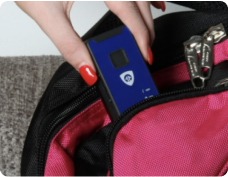
GPS Asset Tracking
With GPS asset tracking, you can monitor your valuables, large and small, from anywhere. Using a GPS tracker gives you the most effective means of monitoring the whereabouts of your valuables so you can protect your assets, whether they are an expensive piece of equipment or technology, a boat, a vehicle, a collection, a personal valuable, or something else. At BrickHouse Security, we can provide you with the best tool to get the job done.
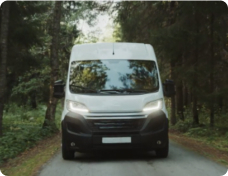
Vehicle GPS tracking
When it comes to tracking vehicles, whether they are personal or company cars or a fleet of vehicles, we offer a wide range of tools to help you track whatever needs tracking. Once you know what goals you want to accomplish with your vehicle tracking, our team of experts can help you determine which of our many GPS devices will be most effective for your needs. Whether you’re monitoring a vehicle driven by family members, a teen driver, or an employee, we’ve got the GPS tracking device to help you accomplish that.

Personal GPS Tracking
A portable GPS tracker is a convenient tracking option for monitoring people and knowing where they are at any moment. While it’s illegal to track a person without their knowledge, there are many relevant personal GPS tracking uses such as monitoring a child walking home from school, keeping tabs on an elderly relative living alone, or even for allowing a loved one to monitor your whereabouts as you go out for a solo hike or a run. Personal GPS tracking devices are smaller than a typical cell phone and extremely portable, making them easy to carry and use.

GPS Child Tracking
Parents are always concerned about the safety of their children, and GPS technology offers solutions for monitoring a child’s movements and location at all times. Parents may choose to use small, portable GPS trackers to monitor their children at the park, walking or bussing home from school, going to their friend’s house, etc. Geofences allow parents to also receive alerts the moment their child reaches a destination or leaves somewhere, such as when they leave school property or when they enter their home. The GPS tracking platform and iOS or Android smartphone apps are fully customizable, allowing parents to ensure that they are tracking what they most want to see.
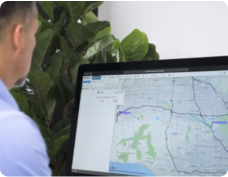
Tracking with your phone or computer
Our smartphone app for iOS and Android allows you to monitor your GPS tracking devices while on the go. You can also set up custom alerts so that you’ll be notified of whichever events are of concern for you, such as when your child leaves school, your employee reaches the customer’s address, or your family vehicle is speeding, to name a few. Our GPS tracking platform and apps work together with all of your devices, giving you the ability to track everything you own all from one convenient location.

International GPS Tracking
Sometimes your GPS tracking needs may require you to track internationally, whether because you or a loved one are traveling or because you have business to attend to in another country. Many of the GPS trackers we carry are available in international versions that can track anywhere in the world. Please note that in order for a device to work internationally, users must supply your own international SIM card to operate the device on an international network.
Is it legal to track someone?
It is legal to track your own property, including any vehicles that you own, whether they are driven by you or a member of your family. When it comes to tracking other people in the vehicles that they own, many states have laws which regulate the use of electronic tracking as part of anti-stalking laws. It’s a good idea to protect yourself by checking on the legality of your GPS tracking applications.
How do I know if there’s a GPS tracker on my car?
It can be difficult to identify a hidden GPS tracker, especially if it’s been professionally installed and is well hidden. Do an exterior and interior sweep on your own or seek professional help if you’re not able to locate a device. For more details, check out our learning article about finding a GPS tracker on your vehicle. Once the device has been located, you can also follow a few simple steps to disable the GPS device.
How can I track a car?
If you need to use a GPS tracker to monitor the movements of a vehicle, there are a number of options available. We invite you to explore our GPS tracking device guide to learn about the different tracking options and which would be most appropriate for your needs. You can also read our article about GPS tracker placement to determine the best location for the tracker to be mounted in the vehicle in order to ensure you get the most accurate results.
How does GPS tracking work?
GPS, which stands for Global Positioning System, operates off of a series of satellites orbiting Earth. These satellites transmit radio signals. A GPS tracker detects those signals and uses them to triangulate its location. Once position is known, the device uses a cellular connection to transmit its location to a web server so it can be recorded and displayed on a map. If you’re looking to dive deeper into how GPS tracking works, you can learn about it in our learning article.
Why is there a SIM card in GPS trackers?
The SIM card is the source of the cellular signal in the GPS tracker. While satellites are responsible for locating the device, the cellular signal is required to send this information to the user via the tracking platform. This information may appear in the form of a moving dot on a map or an alert that provides location coordinates.
Will GPS work indoors?
The most accurate GPS tracking takes place outdoors where the tracking device is positioned in the direct line of sight of at least three global positioning satellites. In some cases, a GPS tracker can also use local cellular towers or nearby Wi-Fi to help pinpoint its location if it cannot communicate with a sufficient number of satellites, but the most accurate location tracking will take place outdoors.
What does a GPS server do?
A GPS server receives and stores all of the location information that has been captured and conveyed by a GPS tracker. This information is accessible by the user via the tracking platform and can be seen as a location on a map or by generating a historical report.
Why is there a monthly fee?
The monthly costs required for GPS tracking cover two things: 1) access to the GPS server which stores your GPS tracker’s location history and 2) the cellular connection used to send the location information to the server so that the user can access the information remotely. Both of these features are required in order for the GPS tracker to function properly and provide the information to the user.
How is an OBD port used for GPS Tracking?
OBD ports, or On-Board Diagnostics ports, are available on all vehicles built for sale in the United States since 1996 and are used to access the computer system for reading emissions tests and diagnosing vehicle problems. This port can also be used for installing additional vehicle components like OBD GPS trackers. An OBD GPS tracker requires only a simple plug-and-play installation and the OBD port provides power directly to the device from the vehicle, eliminating the concern of a dead device battery.
How do I select the right GPS tracker for my situation?
There are four types of GPS trackers: battery-operated, hardwired, plug-in, and satellite-operated. We’ve created a GPS tracker buying guide to help you determine the best tracker type for your needs. We also recommend contacting our team directly so you can discuss your needs with a GPS expert and be paired with the right tool.
How does motion activation work for GPS trackers?
Many GPS trackers are motion-activated to conserve battery life and save on cellular transmission costs. As long as the GPS tracker is not moving, it will only occasionally send updated location information to the user. When a tracker begins to move, the GPS device activates and an update is sent. This is particularly useful for monitoring vehicles that are parked or in storage so the user knows exactly when motion begins. It’s also helpful for conserving battery life while the vehicle is not in motion for a long period of time.
What is a geofence and how is it used in GPS tracking?
Geofences are digital boundaries a user draws on a map in the GPS server. These can be used to demarcate important areas like home, a warehouse, a customer’s business, etc. Alerts are triggered when the GPS tracking device crosses the imaginary boundary line to enter or exit the zone, enabling users to track when the zone was entered or left and for how long. Explore our learning article about geofences to learn about their functions and best uses.
How do GPS trackers get power?
GPS trackers may be powered in one of four different ways: battery, hard-wiring, plug-in, or satellite-powered. Which type of device you choose will depend upon your needs and the location where you intend to track. If you will have reasonable access to the device in order to recharge it when appropriate, a battery-powered tracker might be right for you. If the device will be located inside of a vehicle without needing to be moved, a hard-wired device will likely be the best choice. If you plan to use the device in different vehicles on an as-needed basis, the OBD plug-in tracker will provide you with this ease of use. If you are tracking something in the wilderness or at sea where cellular service is unavailable, you may need to go the route of selecting a satellite tracker which is designed for this application. Learn more by exploring our GPS device guide!
What is reverse geocoding? Why does it matter?
GPS trackers use latitude and longitude coordinates to determine locations, but this information is not very user-friendly and needs to be converted--via reverse geocoding--into a street address. This process requires the system to pinpoint the nearest known points on the map, which are usually intersections of streets, to determine the nearest approximation to a street address. Because this process is an approximation, the location of the physical dot on the map may be more accurate than the actual street address that the system identifies.
Trusted by Top Brands








Using GPS trackers provides a variety of benefits across various applications, including enhanced safety, improved efficiency, better asset management, optimized logistics, and peace-of-mind. Whether you’re using a tracker for personal or business purposes, you can reap many benefits in the form of improved data for more informed decision-making.
If you have questions or want to learn more about GPS tracking and how it could help your business or personal needs, the BrickHouse Security team is here to help. We invite you to contact our experts to develop a custom plan to unlock your business’s full potential or develop a strategy to keep your family safe.





